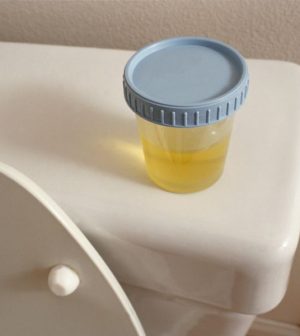- Could Your Grocery Store Meat Be Causing Recurring UTIs?
- Are You Making This Expensive Thermostat Error This Winter?
- Recognizing the Signs of Hypothyroidism
- 10 Strategies to Overcome Insomnia
- Could Artificial Sweeteners Be Aging the Brain Faster?
- Techniques for Soothing Your Nervous System
- Does the Water in Your House Smell Funny? Here’s Why
- Can a Daily Dose of Apple Cider Vinegar Actually Aid Weight Loss?
- 6 Health Beverages That Can Actually Spike Your Blood Sugar
- Treatment Options for Social Anxiety Disorder
Urine May Hold the Key to Your True Age

A simple urine test apparently can reveal how old your body really is — showing its biological, not chronological age.
That information can then help determine your risk for age-related diseases and even death, a new study suggests.
The test checks for a substance — called a marker — that indicates cellular damage from a process known as oxidation. The substance increases in urine as people get older.
“As we age, we suffer increasing oxidative damage, and so the levels of oxidative markers increase in our body,” explained study co-author Jian-Ping Cai, a researcher at the National Center of Gerontology at Beijing Hospital in China.
People’s bodies age at different rates, according to the researchers. That’s due to varying amounts of cellular damage associated with such factors as genetics, lifestyle and environment.
For their study, the researchers focused on an oxidation marker called 8-oxo-7,8-dihydroguanosine (8-oxoGsn). They measured levels of this marker in urine samples from more than 1,200 people in China, ages 2 to 90, and found age-related increases in the marker among those 21 and older.
“Therefore, urinary 8-oxoGsn is promising as a new marker of aging,” Cai said in news release from the journal Frontiers in Aging Neuroscience. The study was published online Feb. 27 in the journal.
“Urinary 8-oxoGsn may reflect the real condition of our bodies better than our chronological age, and may help us to predict the risk of age-related diseases,” Cai said.
More information
The U.S. Office of Disease Prevention and Health Promotion outlines how to protect your health as you age.
Source: HealthDay
Copyright © 2026 HealthDay. All rights reserved.










